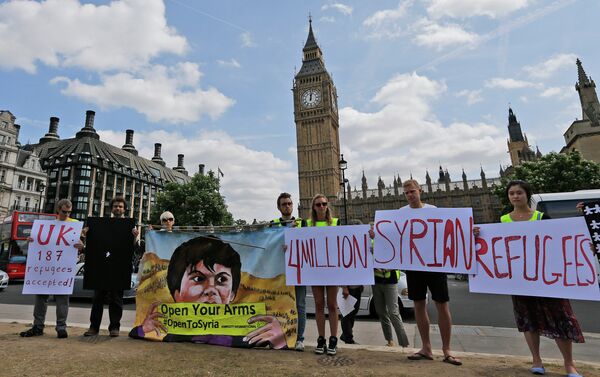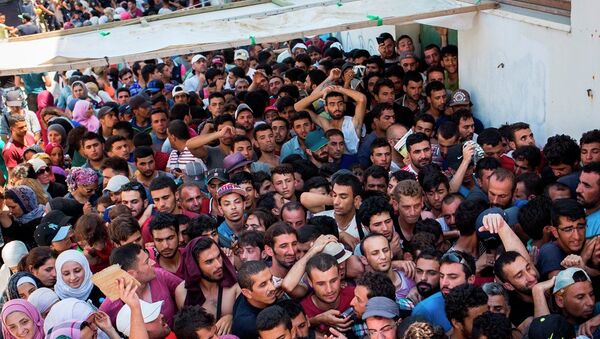The report by the House of Commons Public Accounts Committee will make for uneasy reading, both for the government, and for the thousands of people directly affected by the Syrian Vulnerable Persons Resettlement Program.
'Significant challenge' to resettle 20,000 Syrian refugees in UK by 2020 — our new Report https://t.co/PEPVrHTZqC
— Public Accounts Comm (@CommonsPAC) January 13, 2017
MPs have said that despite some encouraging progress, it will be "a significant challenge to resettle 20,000 Syrian refugees in the UK by 2020".
By the end of September 2016, 4,400 Syrians had been resettled.

It points specifically to what it calls a lack of clarity around what is expected of the program, calling it "too vague".
The Committee say that some councils reported being confused about what they are expected to provide to refugees.
Crucially, many councils, including those who have volunteered to join the program, are still in the dark over how the services and support for refugees should be funded.
Several councils told MPs that they believe the figure of US$10,080 per Syrian for their first year — which reduces each year — was not sufficient to cover the cost of the services they would require.
The report highlighted the survivors of torture as being particularly vulnerable to not getting the support they need.
Chair of the PAC Meg Hillier said:
"It is a stark fact that more than half of the refugees resettled under the program by the end of June last year had suffered torture or violence and it is critical that such people receive specialist support. Our Committee has previously highlighted the shortcomings in access to mental health services and we call on the Government to ensure a plan is in place to properly support refugees in need of them."
The report says that particularity vulnerable refugees could be put at risk.
"It is not yet clear whether survivors of torture or violence are getting the specialist help they need."
The Refugee Council is one of the UK's leading charities that deals with asylum seekers and refugees, and who also gave evidence to the committee.
Responding to the report, Refugee Council Director of Advocacy Dr. Lisa Doyle said:
"The Government's target of resettling 20,000 people is more than achievable and local communities and charities like the Refugee Council are standing ready to help.
"What's needed now is an acknowledgment that the global refugee crisis isn't going away anytime soon and that a longer term strategy for refugee resettlement is needed which clearly outlines roles, responsibilities, resources and an ambitious plan for welcoming refugees beyond 2020."
The Refugee's Council mention of the ongoing refugee crisis is indicative of the fact that Europe's migrant crisis is far from subsiding.
The figure of 20,000 Syrian refugees being accepted by the UK, was pledged by former UK Prime Minister David Cameron in September 2015.
The UK will provide resettlement for more Syrian refugees, taking them from camps. This is on top of our existing £900m programme (1/2).
— David Cameron (@David_Cameron) September 4, 2015
Taking refugees direct from camps allows a safe route to the UK, rather than the hazardous journey that's cost so many lives (2/2).
— David Cameron (@David_Cameron) September 4, 2015
Clearly, a lot has changed since then. Refugee support groups are urging the government to recognize that the need for refugees to be accommodated is greater than the figure first announced by Mr. Cameron.
In their evidence to the Public Accounts Committee in October 2016, the Refugee Council said:
"Given that the number of available resettlement places has historically been, and continues to be, dwarfed by need, we continue to urge the Government to make an ongoing commitment to offer resettlement places at current levels beyond 2020."
In 14 months, <10,000 refugees have been relocated from Greece/Italy to other countries. @EASO graphic shows UK still refusing to take any. pic.twitter.com/9c44O0bntD
— Refugee Council (@refugeecouncil) January 12, 2017
There is also much emphasis on the disparity between how hard the migrant crisis has hit countries in the south of Europe, in comparison to the north.
Q. Did the UK receive the most asylum applications in Europe last year?
— Refugee Action (@RefugeeAction) January 12, 2017
A. No, it was 6th — and 16th when compared to its population size.
In the UK, the Refugee Council has also said that they are concerned that the government's Syrian Vulnerable Persons Resettlement Program does not grant refugee status to new arrivals.
"There are a number of difficulties caused by Syrian refugees who are resettled to the UK being granted 'humanitarian protection' and the Government have never publicly explained why this should be the case. We recommend that all resettled refugees should be awarded 'refugee' status."
The Refugee Council highlighted one of the differences in access to services being in education.
"Whereas people with refugee status are able to access student finance and home fee status from the time they receive their status, those with humanitarian protection are treated differently. In order to qualify for student finance, young people will need to have been resident in the UK for three years at the start of the academic year," the Refugee Council said in evidence to the Public Accounts Committee.
"The lack of access to student finance is a considerable barrier-and in many cases an insurmountable barrier-to young people being able to attend university."
The Public Accounts Committee is calling on the Home Office to "more clearly specify what local authorities are expected to provide to refugees to address any current disparities or confusion."
The UK National Audit Office currently estimates that the program will cost the UK up to $US1,358 million to the end of 2019–20.



